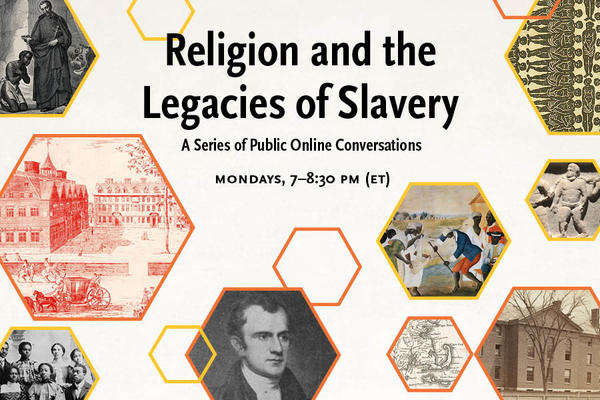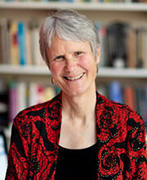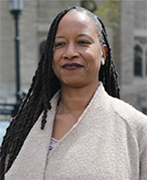 A Series of Public Online Conversations
A Series of Public Online Conversations
Mondays, 7–8:30 pm (Eastern Time Zone)
Harvard Divinity School
Spring Semester 2023
What does the academic study of religion teach us about the complex histories and legacies of slavery? How can a deeper understanding of the roles of religion enhance our commitment to reparative action in our contemporary times?
Building beyond the work of the 2022 Harvard and the Legacy of Slavery report, Harvard Divinity School will host a series of online public conversations with members of the HDS faculty to engage these vital questions from their expertise within the study of religion. Expand your understanding of the complex history and continuing implications of slavery in service of advancing racial justice and healing in our own time and context.
Sponsored by Religion and Public Life, the HDS Office of Diversity, Inclusion, and Belonging, the Harvard & the Legacy of Slavery Initiative, and by HarvardX.
Hosted by Dr. Diane L. Moore, Faculty Director, Religion and Public Life, and Dr. Melissa Wood Bartholomew, Associate Dean of Diversity, Inclusion, and Belonging.
 Diane L. Moore, MDiv '84, is the founding faculty director of Religion and Public Life at Harvard Divinity School, a Lecturer on Religion, Conflict, and Peace at Harvard Divinity School, a senior fellow at the Center for the Study of World Religions, and a Faculty Affiliate of the Middle East Initiative and the Ash Center for Democratic Governance and Innovation. She focuses her research on enhancing the public understanding of religion from the lens of critical theory.
Diane L. Moore, MDiv '84, is the founding faculty director of Religion and Public Life at Harvard Divinity School, a Lecturer on Religion, Conflict, and Peace at Harvard Divinity School, a senior fellow at the Center for the Study of World Religions, and a Faculty Affiliate of the Middle East Initiative and the Ash Center for Democratic Governance and Innovation. She focuses her research on enhancing the public understanding of religion from the lens of critical theory.
 Melissa Wood Bartholomew (she/her), MDiv '15, is the Associate Dean of Diversity, Inclusion, and Belonging at Harvard Divinity School. She is a Christ-centered minister and an attorney with nearly a decade of experience in public interest law. She is committed to a multifaith, multidisciplinary, Afrocentric approach to healing justice rooted in the African philosophy of Ubuntu, restorative justice, and love. Melissa holds a PhD in social work and focuses her research on the impact of racism and other systems of oppression on the mental health of Black people and the role of religion and spirituality in their resistance. She teaches racial justice and healing at HDS and courses in diversity and restorative justice at Boston College School of Social Work and Law School respectively.
Melissa Wood Bartholomew (she/her), MDiv '15, is the Associate Dean of Diversity, Inclusion, and Belonging at Harvard Divinity School. She is a Christ-centered minister and an attorney with nearly a decade of experience in public interest law. She is committed to a multifaith, multidisciplinary, Afrocentric approach to healing justice rooted in the African philosophy of Ubuntu, restorative justice, and love. Melissa holds a PhD in social work and focuses her research on the impact of racism and other systems of oppression on the mental health of Black people and the role of religion and spirituality in their resistance. She teaches racial justice and healing at HDS and courses in diversity and restorative justice at Boston College School of Social Work and Law School respectively.
The first session, January 30, will begin with Sara Bleich, PhD '07, Vice Provost for Special Projects, providing opening remarks to introduce the series.
January 30
Karen L. King joined the HDS faculty in 1997. In 2009, she became the first woman appointed as the Hollis Professor of Divinity, the oldest endowed chair in the United States (1721). She specializes in the history of early Christianity with particular interest in discourses of normativity (orthodoxy and heresy), gender studies, and martyrdom.
February 6
It has long been a historical truism that, in the early modern West, pseudoscientific racial hierarchies replaced religious hierarchies as the dominant framework for understanding human difference and justifying oppressive colonialist practices, including slavery. Recent research has challenged this axiom to suggest how important religious conceptions of difference remained to the racist imagination into the modern period—and, indeed, into our present day. The convergence of racialist and religious orderings of humanity converged in American institutions like Harvard University, persisting in ways with which we have not sufficiently reckoned.
David F. Holland joined the HDS faculty in 2013. A renowned scholar of American religious history, he casts a broad and inclusive net in understanding the deep intellectual, theological, and cultural currents that have shaped American religious history.
Kathryn Gin Lum is associate professor of Religious Studies in collaboration with the Center for Comparative Studies in Race and Ethnicity and History (by courtesy) at Stanford University. She is the author of Heathen: Religion and Race in American History, and co-editor of The Oxford Handbook of Religion and Race in American History.
February 13
Harvard Divinity School was founded nearly forty years after slavery was abolished in Massachusetts, yet many of our school’s founders and early students were intimately familiar with both enslavement and the slave trade. Harvard and the Legacy of Slavery highlights the case of our first dean, John Gorham Palfrey, who was abandoned as a child in Boston when his father moved to Louisiana to establish a plantation. Palfrey’s mentor William Ellery Channing, who was the intellectual founder of the Divinity School, was the great grandson of a slave trader and in his own childhood was cared for by a formerly enslaved woman, Duchess Quamino. Channing was also related by marriage to the Perkins and Higginson families, who had derived vast fortunes from trade in slaves and slave-produced goods. These family legacies shaped the antislavery commitments of people like Channing and Palfrey, while the associated fortunes laid the foundation for the Divinity School endowment. In this session, we will consider whether the exploration of family histories can inform reparative work in the present day. Please consider reading sections 3.3 and 4.2 of the Report of the Presidential Committee on Harvard & the Legacy of Slavery ahead of February 13.
Dan McKanan, AB '89, joined the HDS faculty in 2008. He researches religious and spiritual movements for social transformation in the United States and beyond. McKanan serves on the Unitarian Universalist Panel on Theological Education and the board of the Unitarian Universalist Studies Network. At Harvard, he serves as chair of the MTS Curriculum Committee and as faculty director for the Divinity School’s Program for the Evolution of Spirituality.
February 27
The 1619 Project spawned an unprecedented national conversation in and outside the classroom on slavery’s ongoing afterlives in American society. The enthusiastic response to the project was not universal. A few historians noted in a letter to the Times that the project reflected “a displacement of historical understanding of ideology.” The challenge raised here underscores central ethical concerns at the center of American national identity: who is responsible for slavery? What role does religion play in addressing the lingering “afterlives” of African enslavement in the United States? Do African and African American scholars play a unique role in public debates and scholarship on slavery? Terrence Johnson will examine how the writings of W.E.B. Du Bois and Toni Morrison establish a framework for exploring the role of religion and ethics in grappling with the memory and history of African enslavement.
Terrence L. Johnson, MDiv '00, joined the HDS faculty in 2022. His research interests include African American political thought, ethics, American religions, and the role of religion in public life. He weaves together African American religions, political theory, and American history to paint broad conceptual schemes for imagining religion, democracy, ethics, liberalism, justice, and freedom.
March 6
Slavery is most readily associated with the U.S. American South with the geographies of the North often eclipsed. Tracey Hucks will lead a discussion on slavery and the slave trade that focuses on New England and the DeWolf family of Rhode Island. The DeWolf family was understood as the largest slave-trading family in the United States and Dain Perry, a direct descendant, will be featured in this webinar. The event will also highlight the reparative and healing workshops co-facilitated by Dain and his wife Constance Perry conducted throughout the U.S. at religious, social, and educational institutions. Participants interested in this webinar might also want to view in advance the documentary, Traces of the Trade, which follows DeWolf family descendants on a historical journey from New England to West Africa and onto the Caribbean. Please consider reading chapter two of the Report, "Slavery in New England and at Harvard," and viewing Traces of the Trade ahead of March 6.
Tracey E. Hucks, AM '95, PhD '98, joined the HDS faculty in 2022. She is a nationally known and esteemed scholar of Africana Studies and American Religious History, currently researching the role of Africana religious cultures in the shaping of diaspora identities. She was an elected member of the Program Committee of the American Academy of Religion, and the Executive Committee of the Society for the Study of Black Religion. Most recently, Hucks served as Provost and Dean of the Faculty at Colgate University and is currently a member of Haverford College Corporation.
Dain Perry grew up in Charleston, SC. He and his wife Constance travel the country screening Traces of the Trade and facilitating conversations on racial reconciliation. Dain served 30 years in the financial services industry in Boston. Previously he served as deputy director of the Massachusetts Council on Crime and Correction and Acting Director of the Crime and Justice Foundation, non-profit organizations which promoted reform in the criminal justice system.
Constance Perry grew up in Boston, Massachusetts. For more than twenty years, she managed, designed and implemented programs for at-risk youth and adults at the municipal, state and national level. Constance was a self-employed national consultant for twelve years specializing in training, facilitation and on-site consultation services to community organizations. She and her husband Dain travel the country screening Traces of the Trade and facilitating conversations on racial reconciliation.
March 20
This session will be a discussion among presenters reflecting upon the insights shared throughout the series. In addition to identifying themes and throughlines among sessions, we will return to the overarching questions that framed this collaboration: What does the academic study of religion teach us about the complex histories and legacies of slavery? How can a deeper understanding of the roles of religion enhance our commitment to reparative action in our contemporary times?